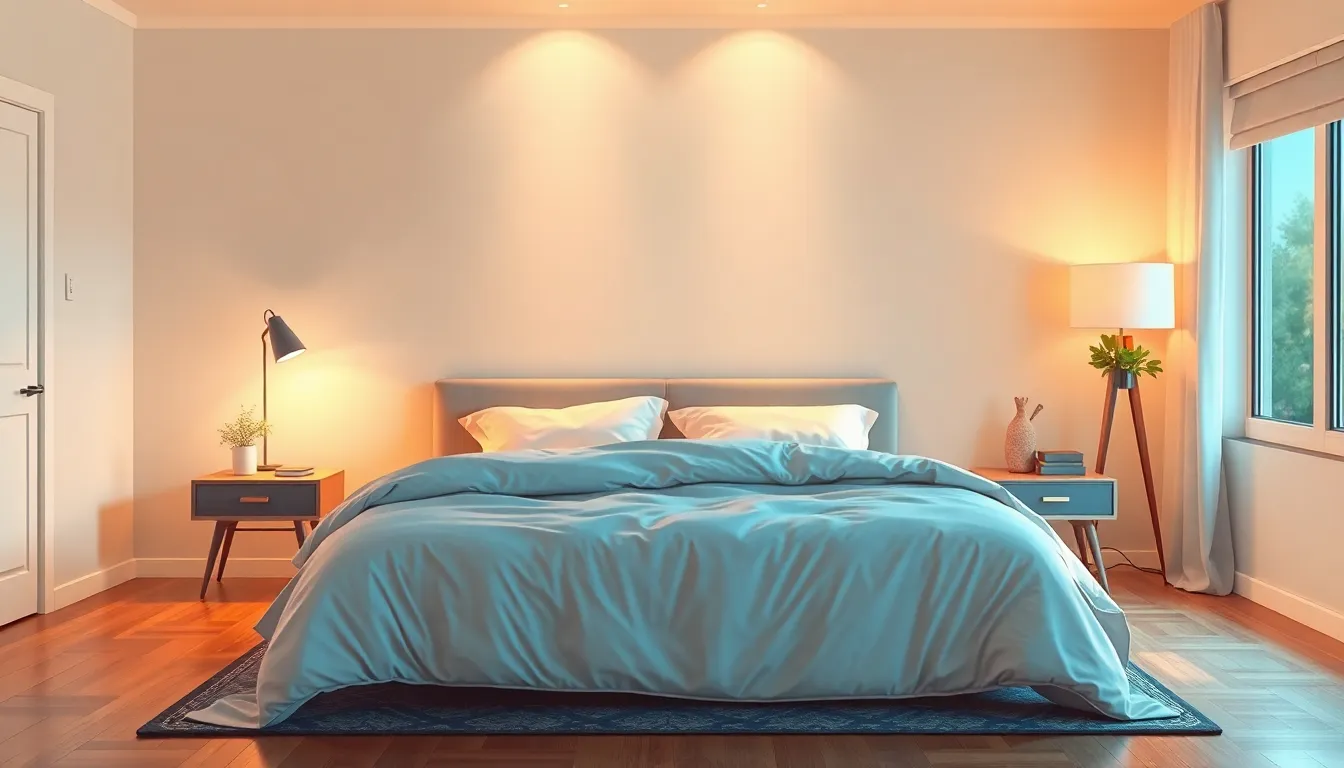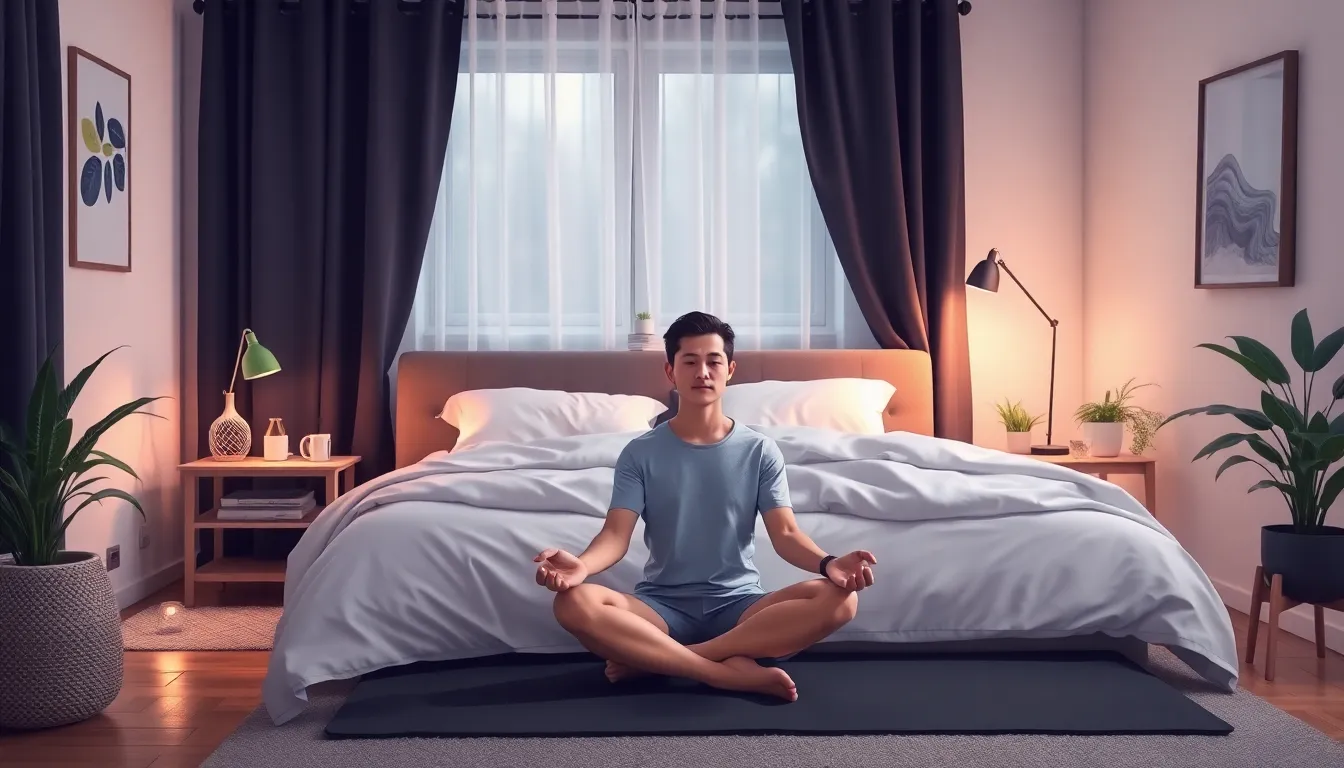In a world where sleepless nights are the norm, the quest for better sleep has never been more crucial. Imagine waking up feeling like a superhero instead of a zombie—ready to conquer the day instead of just surviving it. Sleep enhancement isn’t just a luxury; it’s a necessity for anyone who wants to thrive in today’s fast-paced life.
Table of Contents
ToggleWhat Is Sleep Enhancement?
Sleep enhancement refers to the strategies and practices aimed at improving the quality and efficacy of sleep. Individuals often seek ways to increase their restorative sleep experiences, leading to better overall health and well-being. Techniques for sleep enhancement include optimizing sleep environments, employing relaxation methods, and adhering to sleep schedules.
Implementing environmental changes can significantly affect sleep quality. A dark, quiet room with appropriate temperatures promotes deeper sleep. Utilizing comfortable bedding and minimizing distractions enhances individual comfort.
Adopting relaxation methods contributes to better sleep. Practices such as mindfulness meditation, deep breathing exercises, and progressive muscle relaxation prepare the mind and body for rest. These strategies reduce anxiety and stress levels, paving the way for uninterrupted sleep.
Maintaining a consistent sleep schedule supports the body’s natural circadian rhythms. Going to bed and waking up at the same time daily helps regulate the sleep-wake cycle. This consistency improves the body’s adaptation to sleep patterns.
Tracking sleep patterns may also aid in enhancement efforts. Sleep diaries and wearable sleep trackers provide insights into sleep quality, duration, and disturbances. Analyzing this data allows individuals to make informed adjustments to their routines.
Incorporating nutritious foods into the diet can also impact sleep quality. Foods rich in tryptophan, magnesium, and antioxidants promote relaxation. Avoiding caffeine and heavy meals close to bedtime further facilitates better sleep.
Addressing underlying health issues can lead to significant improvements. Conditions like sleep apnea or insomnia may interfere with restful sleep. Consulting healthcare professionals helps pinpoint these issues and offers appropriate treatment options.
Benefits of Sleep Enhancement

Sleep enhancement offers numerous benefits that significantly impact both physical and mental health. Improved sleep quality directly influences overall well-being.
Physical Health Improvements
Better sleep contributes to various physical health improvements. Enhanced sleep strengthens the immune system, reducing susceptibility to infections. Quality sleep aids in maintaining a healthy weight by regulating hormones related to appetite. Improved cardiovascular health emerges as better sleep lowers blood pressure and reduces the risk of heart disease. Additionally, it facilitates muscle recovery and growth, making sleep crucial for athletes. Research indicates that adults who sleep adequately show lower rates of chronic diseases. Prioritizing sleep influences overall life expectancy positively.
Mental Health Benefits
Sleep enhancement plays a vital role in mental health benefits. Sufficient sleep enhances cognitive function, leading to better decision-making and problem-solving abilities. Improved mood stability occurs with adequate rest, lowering the risk of anxiety and depression. Sleep also supports emotional regulation, which helps individuals manage stress more effectively. Studies show that people who prioritize sleep report higher levels of overall happiness and life satisfaction. Strong connections exist between good sleep and improved memory retention, which aids learning. Focusing on sleep quality fosters better mental clarity and resilience.
Techniques for Sleep Enhancement
Improving sleep quality involves several effective techniques tailored to individual needs. Incorporating lifestyle changes, optimizing sleep environments, and utilizing sleep aids can significantly enhance restfulness.
Lifestyle Changes
Adopting a consistent sleep schedule greatly benefits sleep quality. Limiting caffeine intake, especially in the afternoon, promotes better rest. Engaging in regular physical activity helps regulate sleep patterns, while avoiding screens before bedtime reduces exposure to blue light, allowing the body to wind down. Mindfulness practices, including meditation or gentle yoga, can also help alleviate stress and create a peaceful mindset, supporting restful nights.
Sleep Environment Optimization
Creating a sleep-conducive environment is essential for relaxation. A dark, cool room promotes optimal sleep conditions, with an ideal temperature set between 60°F and 67°F. Investing in quality mattresses and pillows enhances comfort, while blocking outside noise with white noise machines or earplugs can minimize distractions. Incorporating calming scents, such as lavender, through essential oils or scented candles may further encourage peaceful sleep.
Sleep Aids and Supplements
Exploring sleep aids and supplements can provide additional support for restless sleepers. Melatonin, a natural hormone, regulates sleep cycles, and many find it beneficial in managing sleep onset issues. Herbal supplements, including valerian root and chamomile, may also promote relaxation and improved sleep quality. Before introducing any supplements, consulting with a healthcare professional ensures safety and effectiveness tailored to personal health needs.
Common Myths About Sleep Enhancement
Many believe that sleeping longer guarantees better sleep quality. Increased sleep duration doesn’t always equate to feeling refreshed. Aiming for quality is essential, as deep, restorative sleep is more beneficial than merely extending time in bed.
Some think consuming alcohol before bedtime aids sleep. Alcohol may initially induce drowsiness, but it disrupts the sleep cycle, leading to frequent awakenings. Prioritizing hydration and calmer pre-sleep rituals promotes deeper rest.
Another common misconception involves the idea that naps are harmful for nighttime sleep. Short naps can actually boost alertness and performance if kept under 30 minutes. Timing matters too; taking a nap too late in the day can interfere with night sleep.
People often assume that sleep aids and supplements are a one-size-fits-all solution. While options exist, efficacy and safety vary by individual. Consulting a healthcare professional is crucial for determining which, if any, aid is appropriate.
Many adults underestimate the impact of sleep environment on sleep enhancement. A dark, cool, and quiet room significantly influences how well someone sleeps. Investing in quality bedding and minimizing noise can lead to notable improvements.
Lastly, some believe that they can “catch up” on sleep during weekends. Frequent sleep deprivation leads to a cumulative deficit that causes more than just fatigue. Recovery periods are helpful but often insufficient for addressing chronic sleep issues.
Prioritizing sleep enhancement is vital for achieving optimal health and well-being. By implementing effective strategies and creating an ideal sleep environment, individuals can significantly improve their sleep quality. This not only boosts physical health but also enhances mental clarity and emotional stability.
Making small adjustments in daily routines can yield profound benefits. Embracing a consistent sleep schedule and engaging in relaxation techniques can transform how one feels each day. Ultimately, investing in better sleep is an investment in a healthier, happier life.



